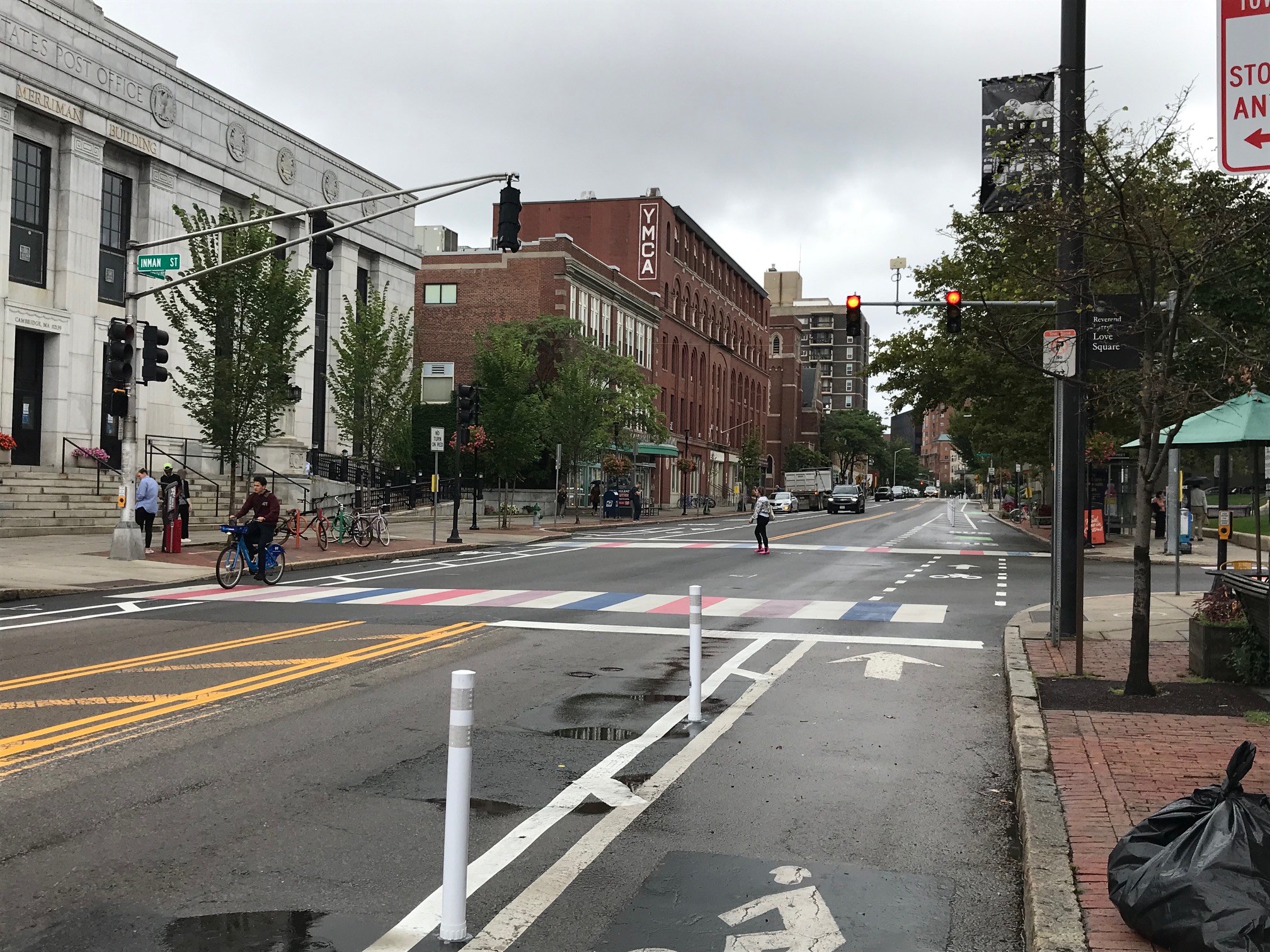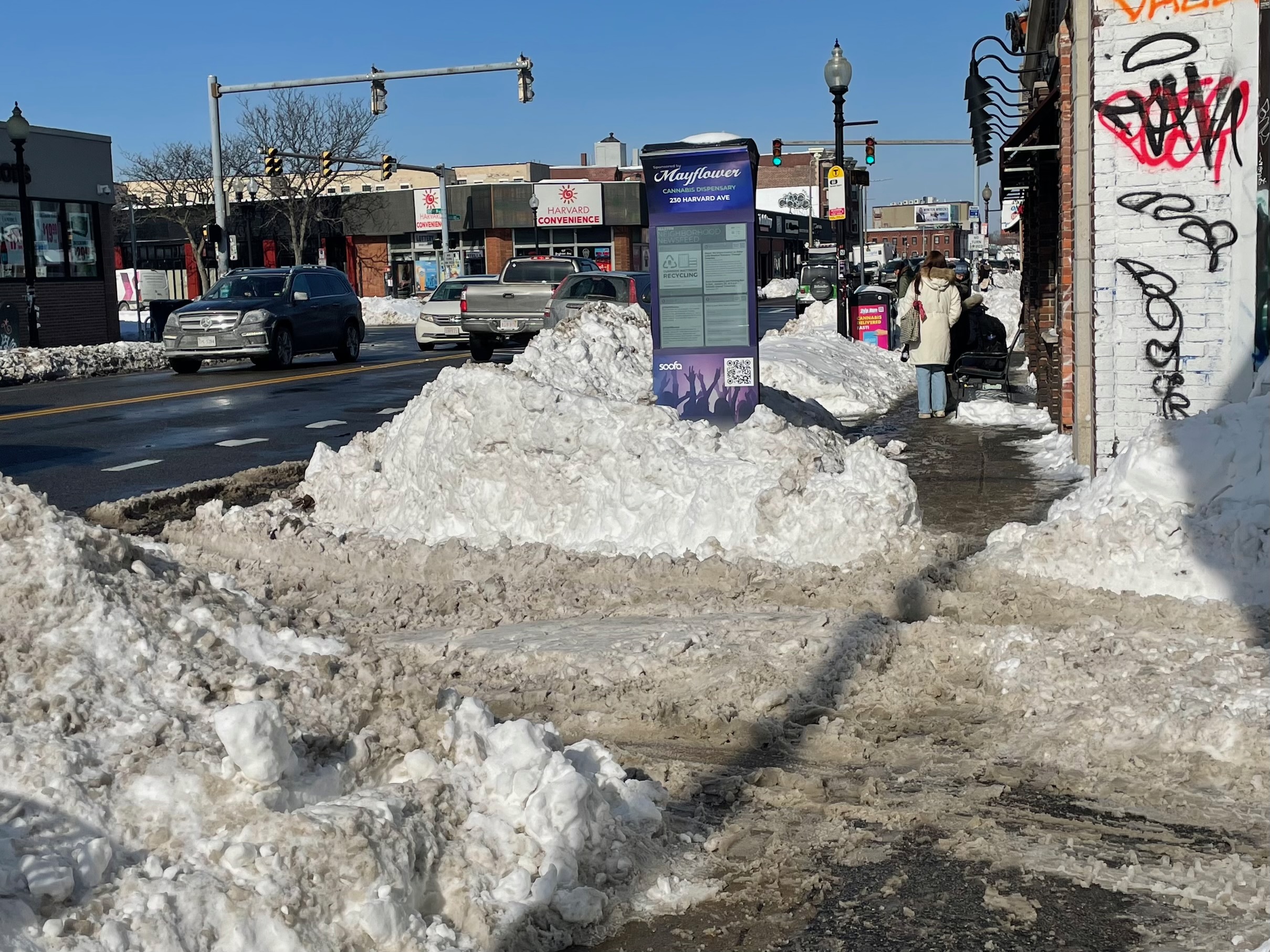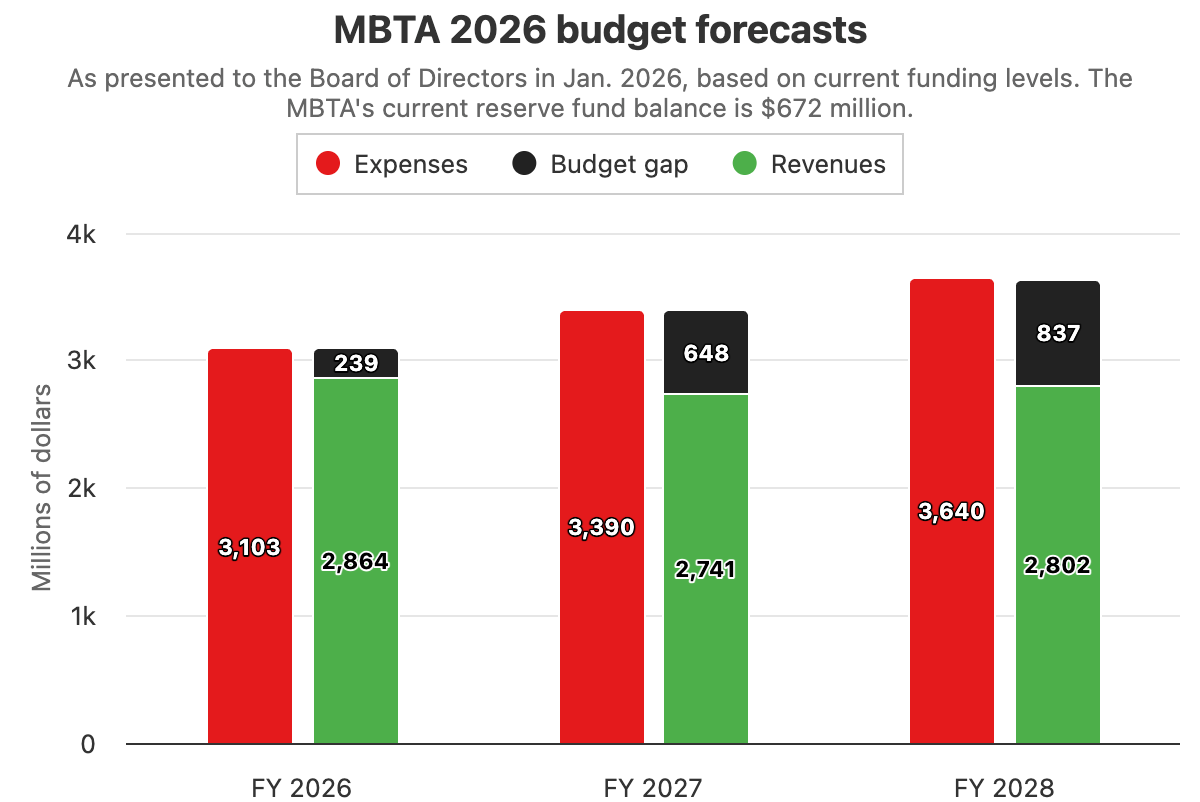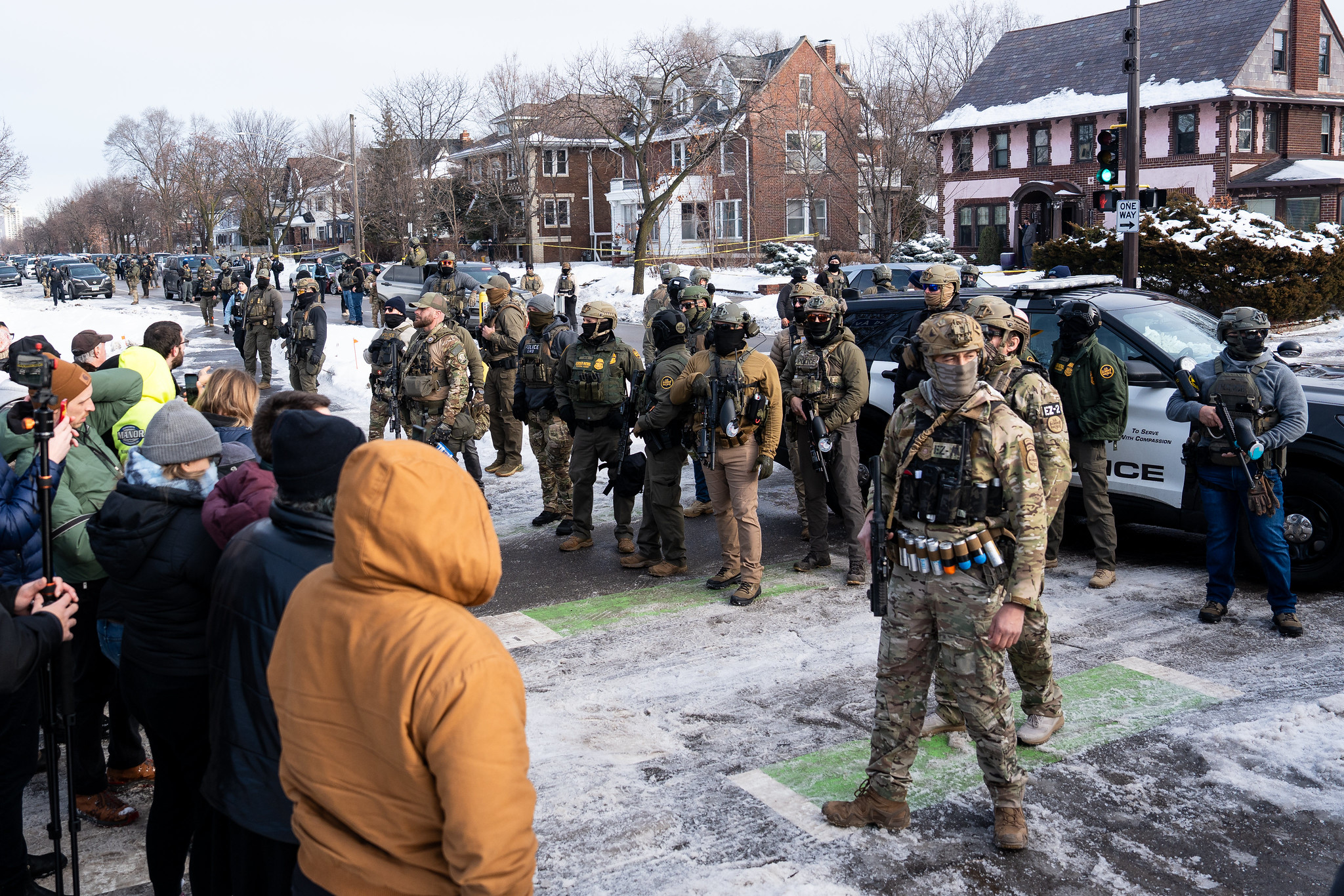This fall, a number of politicians across the Commonwealth attempted to step into public office from campaign platforms that railed against roadway safety improvements and affordable housing.
But when it came time to count the votes on Tuedsay night, voters overwhelmingly rejected the most vocal not-in-my-backyard candidates, and instead re-elected a number of incumbents who took risks on policies aimed at safer, more inclusive cities.
Here's a roundup of notable results from last week's elections.
Cambridge: Council Majority Still Supports Bike, Housing Plans
Perhaps the municipal election with the most at stake this fall was Cambridge's City Council race, where three incumbents (one-third of the Council) who had previously supported the city's ambitious Cycling Safety Ordinance decided not to seek re-election this year.
Meanwhile, the anti-bike-lane organization Cambridge Streets for All fielded two candidates, Joan Pickett and John Hanratty.
Pickett and Hanratty also both campaigned against the city's updated Affordable Housing Overlay, an ordinance designed to encourage the construction of more affordable housing by legalizing taller buildings near subway stops and major bus routes.
Pickett finished ninth place on election night, which was enough to elect her to the last seat on the Council, while Hanratty placed 14th.
Under Cambridge's ranked-choice voting system, hundreds of Hanratty's ballots were re-allocated to Pickett after he was eliminated from the race, helping push her over the threshold to victory.
Meanwhile, over 60 percent of Cambridge voters picked Cycling Safety Ordinance supporters as their first-choice candidate, including Mayor Sumbul Siddiqui, who was the first choice for 3,350 voters (14 percent), and Councilor Burhan Azeem, who was the first choice for 2,247 voters (10 percent).
Cambridge Bicycle Safety, the grassroots organization that advocated for the city's Cycling Safety Ordinance and canvassed extensively this fall to support candidates who pledged to uphold the law, declared the election a "victory."
"Candidates we endorsed won five of the top six slots in Tuesday’s City Council election," wrote the organization in an email to supporters last Thursday. "We maintained a majority of councilors who have a track record of supporting infrastructure improvements — despite coordinated efforts to derail (the Cycling Safety Ordinance)."
Boston: A Tough Night for Anti-Bike Anti-Vaxxers
Compared to Cambridge, the Boston City Council is less involved in transportation and housing policy decisions, and these issues were less prominent in Boston's city council races.
But Mayor Wu, who has been taking bolder executive positions to expand the city's bike network and roll out more dedicated bus lanes, consolidated support on the city council after three of her endorsed candidates won their races.
This year's Council election also marked the departure of two longtime city councilors who represented an older, whiter demographic, and often expressed skepticism over efforts to reduce pollution and increase safety on the city's streets. District Councilor Frank Baker of Dorchester and at-large Councilor Michael "five-car" Flaherty of Dorchester both decided not to seek re-election this year.
Henry Santana, a former director in Mayor Wu’s Office of Civic Organizing, will take over Flaherty's seat, and former Boston Planning and Development Authority staffer John FitzGerald will take over Baker's seat.
Mayor Wu's endorsements also helped two other newly-elected City Councilors: Ben Weber will take over Councilor Kendra Lara's seat in District 6 (West Roxbury and Jamaica Plain), and Enrique Pepén will take over Councilor Ricardo Arroyo's seat in District 5 (Roslindale, Mattapan, and Hyde Park).
There were two City Council candidates this year who attempted, unsuccessfully, to leverage grievances against bike lanes into the broader right-wing culture war.
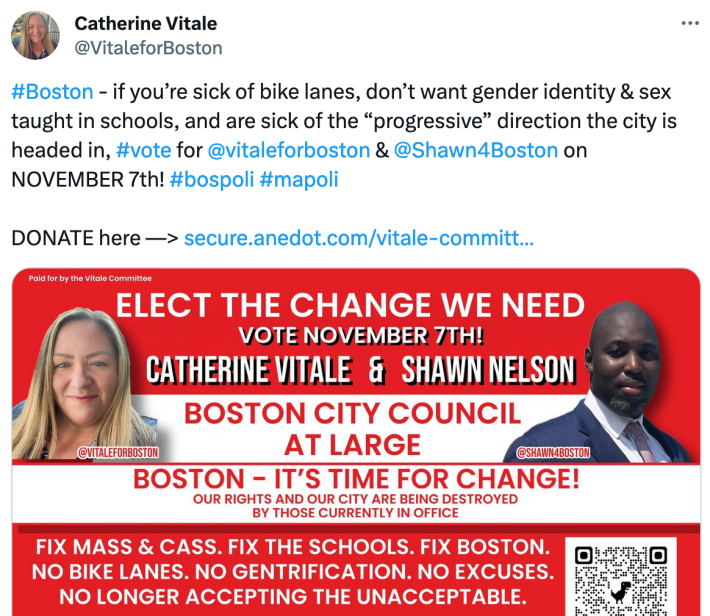
At-large candidates Catherine Vitale and Shawn Nelson both pledged to "eliminate bike lanes" during their campaigns for an at-large council seat.
"They're trying to make it as undesirable as possible to drive cars in the city," warned Vitale at a meeting on the city's safety improvements to Centre Street in West Roxbury earlier this summer. "They want us to stay in the 15 minute radius and they want to watch everything that we do and control everything that we do.”
Even though Vitale arguably earned some name recognition after her 2022 arrest for assaulting a Boston police officer during an anti-vaccine protest, she finished dead last in last week's race, with less than 4 percent of the vote. Nelson did slightly better, with 5 percent.
Worcester: Feints on Street Safety Knock Out Boxing Champ
The Worcester City Council will remain relatively unchanged after last week's election, which could be seen as a vote of confidence in the city's increasing interest in safe streets projects and initiatives like the fare-free WRTA bus service.
In one of the city's most hotly-contested races, incumbent Etel Haxhiaj, who is currently serving her first term on the City Council, faced a challenge from former pro boxing champion Jose Antonio Rivera in District 5 on the city's west side.
One flashpoint in the campaign involved the city's plans to establish a road diet with space for new protected bike lanes as part of a paving project on Mill Street.
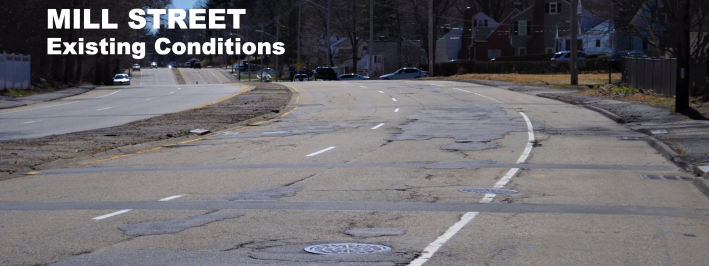
Mill Street was formerly a divided four-lane boulevard where drivers frequently hit highway speeds through a suburban residential neighborhood.
Rivera filed an unsuccessful petition to stall the road diet earlier this summer, but later statements suggested that his heart wasn't really in the fight.
"The work scheduled to be done on Mill Street includes measures that will undoubtedly make this dangerous road safer for everyone," Rivera said in a statement a week after his petition failed to get any traction.
Haxhiaj, meanwhile, maintained steadfast support for the project, which is being implemented now.
Rivera ultimately lost his challenge in a tight race, with 49 percent of the vote to Haxhiaj's 51 percent.
